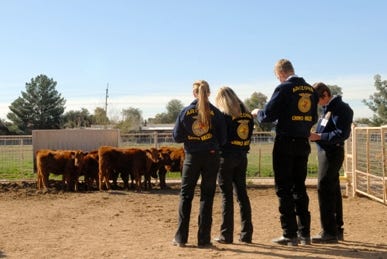Does your local school support agricultural education?
September 28, 2015

One of the highlights of my four years of high school (almost a decade ago) was the agricultural classes I had the opportunity to enroll in. These classes were a nice break from the typical studies and a chance to dive into something I had a special interest in. Whether it was welding, animal science, horticulture, or agricultural business, these classes still offered lessons in math, reading, science and the other core areas of education, while allowing students to develop applicable skills for career opportunities that exist in agriculture.
More than that, by taking agricultural classes during high school, I was also able to join my school’s FFA chapter, where I competed in competitions like job interview, public speaking, extemporaneous speaking, nursery landscape, livestock judging, food science and more. Additionally, I had the chance to serve as a district officer, attend leadership camps and make friends with peers whom I had shared interests with.

Photo Credit: Arizona FFA www.azffa.org
However, despite the many benefits of agricultural education and the FFA experience, I often felt like my school didn’t appreciate these courses. Plus, with the added pressures of government-mandated test standards, there was little time in our course schedules to fit in agriculture, making it a tough choice for some students who truly wanted to take these agricultural classes.
I know that I’m fortunate to have been able to have an ag program in my school because some of my peers did not, due to budget constraints, less than supportive administrators or no available teacher to fill the spot.
Depriving students of these opportunities is a huge mistake, in my opinion, as agricultural professionals will be key to feeding a growing global population. According to agcareers.com, “To feed and clothe the world, educated and talented agricultural professionals are needed; 81% of jobs in the ag industry require education beyond high school and almost half require at least a bachelor’s degree.”
In 2008, there was a deficit of 9,317 graduates with agricultural degrees to fill open positions in the U.S., according to the website. “The USDA also estimates there are or will be 54,400 annual openings for individuals with baccalaureate or higher degrees in food, renewable energy, and environmental specialties between 2010 and 2015.”
Agriculture positions are not only production-based, but encompass a broad range such as sales representatives, research scientists, quality assurance, marketing and engineers, just to name a few. The website says people may also be surprised to find out that the average starting salary for a graduate in the ag industry is almost $49,000. “Job seekers also feel the agriculture industry is more stable (46%) or as stable (41%) as other industries, according to the last AgCareers.com Job Seeker Survey.”
In light of this topic, this week’s poll on beefmagazine.com asks, “Is ag education supported in your school district?” The voting is just getting underway, but so far, 68% say, “Yes, our school administrators support agricultural education, and we have good programs in our high schools.” Meanwhile, 28% don’t think their school district has a good agricultural education program. The final 4% aren’t sure.
Vote in the poll here, and let us know your thoughts. I would love to hear about the ag programs in your neck of the woods.
By the way, we had anticipated announcing the winners of our Greeley Hat Works’ “Hard-working American beef producer” photo contest today, but we had a tremendous turnout of voters and need a little extra time to calculate the results. Stop by tomorrow to find out who our big winners are!
In the meantime, here is the gallery of 70+ reader entries for you to browse this morning. The opinions of Amanda Radke are not necessarily those of beefmagazine.com or Penton Agriculture.
You might also like:
70 photos honor the hardworking cowboys on the ranch
Chipotle facing lawsuit for GMO-free claims
Will beef demand keep up with cowherd expansion?
Why you shouldn't feed your cows like steers in a feedlot
What's the best time to castrate calves? Vets agree the earlier the better
You May Also Like


.png?width=300&auto=webp&quality=80&disable=upscale)
